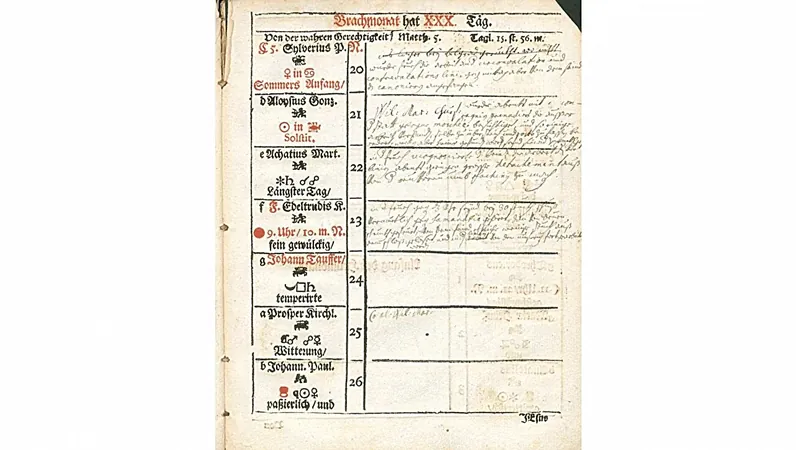
Unveiling the Mysteries of 17th Century Calendars: What Did We Lose?
2024-11-19
Author: Yu
Exploring Historical Calendars
In our fast-paced modern world, recalling events from just a day ago can be challenging, let alone remembering occurrences from centuries past. Early modern historian Achim Landwehr has shed light on this intriguing issue, exploring the gaps and absences found within 17th-century calendars, which reveal much more than lost time—they tell a story about changing perceptions of time itself.
The Iceberg of History
Landwehr highlights that what remains from these eras is far from the complete story, likening it to “a small dome of snow atop an iceberg,” where much lies hidden beneath the surface. His study of these old calendars has uncovered significant insights into societal attitudes during the period. Selling in the millions, these calendars were affordable, mass-produced household items filled with predictions and practical advice—covering everything from weather forecasts to optimal days for harvesting crops or even cutting hair.
The Blank Spaces
However, as Landwehr began to examine the calendars from the latter half of the 17th century, he encountered a puzzling phenomenon: many of them were almost blank, containing little more than the date itself. This stark emptiness sparked his curiosity. “I believed there was an underlying narrative to this seemingly mundane shift,” he explains. With the decline in belief that daily events were divinely predetermined, the notion of time transitioned from being a fixed measurement of destiny to something individuals could shape themselves. This invites the concept of agency—humans are encouraged to fill these calendar pages with their own plans, hopes, and aspirations.
Scientific Advancements and Philosophical Shifts
But why were these calendars found devoid of rich content? Could the scientific advancements of the time—such as experiments with vacuums—be hinting at a larger philosophical realignment in how people understood both space and time? Landwehr's research looks into these themes, inviting us to consider how 17th-century society grappled with the unknown and the unmeasurable aspects of life.
Contemporary Reflections
In a parallel vein, Landwehr reflects on our contemporary engagement with emptiness—how in our busy lives we attempt to fill our calendars, yet acknowledge that some slots will always remain unfilled. He poignantly states, “Despite our best efforts, we cannot reconstruct the past with precision. The limits of modern forecasting echo our historical shortcomings.”
Redefining Our Relationship with Time
This expedition into the empty pages of history not only highlights our lost connection with time but challenges us to rethink our relationship with it today. Are we simply marking time, or are we truly making the most of it? The deeper implications of Landwehr's work resonate perhaps more than ever, suggesting a reflection on how we choose to engage with the moments we have.

 Brasil (PT)
Brasil (PT)
 Canada (EN)
Canada (EN)
 Chile (ES)
Chile (ES)
 España (ES)
España (ES)
 France (FR)
France (FR)
 Hong Kong (EN)
Hong Kong (EN)
 Italia (IT)
Italia (IT)
 日本 (JA)
日本 (JA)
 Magyarország (HU)
Magyarország (HU)
 Norge (NO)
Norge (NO)
 Polska (PL)
Polska (PL)
 Schweiz (DE)
Schweiz (DE)
 Singapore (EN)
Singapore (EN)
 Sverige (SV)
Sverige (SV)
 Suomi (FI)
Suomi (FI)
 Türkiye (TR)
Türkiye (TR)